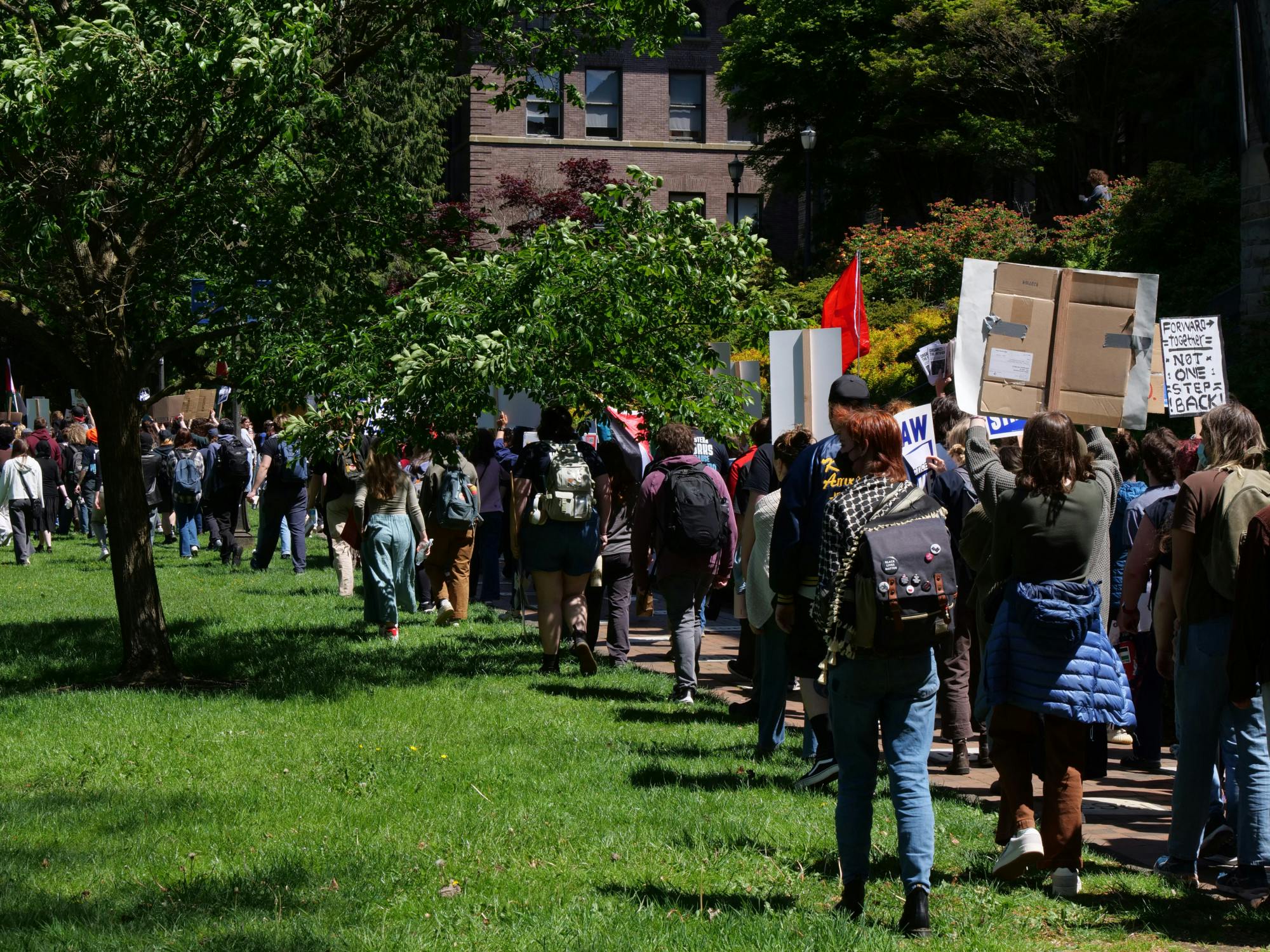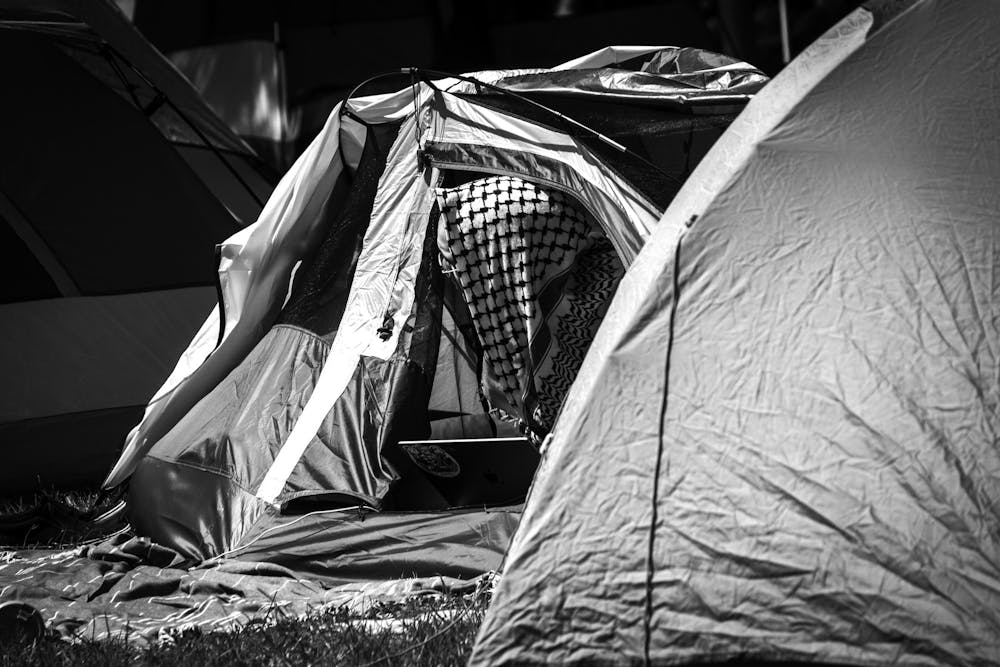Pro-Palestine protesters have now been occupying the lawn in front of Old Main for over one week. Since it began on Tuesday, May 14, the encampment has grown to include approximately 50 tents and a steady population of student protesters.
On Friday, protesters from the pro-Palestine encampment and Western Academic Workers United carried signs and chanted as they marched across Old Main and Red Square, calling for divestment from companies that fund and support Israel.
“This movement for divestment is not new. This is not something that happened three weeks ago. Students have been asking for this for actual years,” said Jasmine Welaye, an organizer for the encampment and a Syrian-American graduate student who also serves as chair of Western’s Arab Student Association.
The encampment has stated a commitment to remain in place until the University meets their five demands. These include that the university disclose its financial information, fully divest from companies involved with Israel, increase funding for its Ethnic Studies program while offering more decolonial teachings, and acknowledge harm and wrongdoing done to Arab and Arab-American students.
“We write this letter as a diverse and rapidly growing coalition of student organizations led by Western Washington University’s Jewish Voice for Peace and Arab Student Association,” the student demands letter reads. “We are united in our unshakeable demand for a free and liberated Palestine.”
The encampment received broad community support outside of student organizations, Welaye said.
“The majority of people here have no affiliation with ASA and JVP,” they said.
The encampment was set up in the early hours of May 14, transforming Old Main into a protest site by setting up a rope barrier, tents and handmade signs.
“Getting the community involved was definitely the priority [on the first day],” Welaye said.
According to Welaye, the encampment received abundant support from Bellingham and beyond, receiving donations through Venmo, as well as food and supplies.
“People are really wanting to play a bigger role in … the process of decolonization and divestment from Israel,” they said. “A lot of people are starting to tune in.”
Organizers ensure potential participants understand the encampment's action-oriented motivations, Welaye said.
“It’s to get the university to divest and cut ties, no matter how indirect they are, to any company that's affiliated with Israel,” they said. “That has to happen, and we are making sure that people know that. That is our primary, main goal when they're entering the encampment.”
The onboarding process also includes ensuring people know the potential risks of participating.
“There is a lot of work being done into making sure that everybody is safe and knows what they're risking upon entering the encampment,” Welaye said.
Encampment organizers have stated a commitment to remain non-violent and respect the land they are camped on. Katy Potts, Western’s chief of police, said that campus police have no plans to intervene as long as the protests remain peaceful.
“The university respects the rights of our students to protest, and as long as nobody is being harmed or threatened and there is no damage or vandalism accompanying the peaceful protest, the current approach is that campus police will not engage,” Potts said.
Earlier in the week, the University washed away a message reading “Popular University for Gaza” on the front steps of the Wilson Library. On Friday morning, the fountain in Red Square was dyed red and has since been drained. A media liaison for the encampment said that whoever dyed the fountain was not associated with the encampment and did not consult them before doing so.

Signs around the encampment warn that undocumented students should be aware of police presence.
“Campus police have not and will not be involved in any kind of action against our undocumented students based on their citizenship status, nor will we work with any other agency in an action like this on our campus,” Potts said.
Potts said that campus police are primarily concerned with safety.
“Our first job is always to make sure our students are safe, whether they are in an encampment or a classroom,” she said.
According to Welaye, the university has not done enough to protect or support its Arab and Arab-American students.
“Whenever we run Israeli Apartheid week, every single year, we get threats on our Instagram messages,” she said. “People will come and just stand and intimidate us, or they'll get into arguments about anything.”
Counter-protests have been limited at the encampment so far. Welaye said that some people tried to disrupt the encampment by playing loud music in the early morning of May 14, as well as acts of other forms of intimidation.
“[Spreading misinformation about pro-Palestine events] is one intimidation tactic that I don't think that the university really takes into account, and they view [it] as a difference in opinion rather than discrimination,” Welaye said. “When people come out and say that everything that ASA is doing is anti-semitic, that is a form of anti-Arab [and] anti-Palestinian racism.”
The encampment is directly outside Old Main, the building where President Sabah Randhawa’s office is located. Western's encampment comes after a slew of similar occupations on campuses across the country.
“We have gotten direct feedback from students in Palestine that professors here have connections with, and they talk about how motivating it is to see these student encampments pop up in American universities,” Welaye said. “That is something really powerful.”
Other universities, such as the University of California Riverside and the University of Minnesota, have reached agreements to divest from Israel after student protests. Both universities declined to provide further comments to The Front on the resolution process with student groups.
UC Riverside’s agreement with protesters includes publicly disclosing its investments, creating a task force to explore removing its endowment from UC’s investment office, and a commitment to an ongoing review of Sabra Hummus “consistent with existent product review processes.”
Pro-Palestine groups have called for a boycott of Sabra, dating back to 2010, because of the support its parent company, the Strauss Group, has provided to the Israeli Defense Forces’ Golani Brigade.

Western’s administration has yet to reach an agreement with protesters. On Friday, President Randhawa addressed the university’s dialogue with student protesters in a written statement.
“It is important to recognize the significance of the issues driving the encampment,” Randhawa wrote. “The humanitarian crisis in Gaza is tragic and demands urgent attention.”
Randhawa’s statement included the email he sent to ASA and JVP representatives on May 14. In it, he responded to the protesters' demands and invited them to weigh in at the next scheduled board meeting on June 14.
“We are open to developing a new process for consideration of divestment from companies or industry sectors, and we hope to continue to explore this concept in subsequent meetings with you,” the email said.
The university’s response did not contain any commitments to meet the encampment’s demands.
“We understand your concern that the administration has been silent on the war and the impact on Palestinian people. We respect the views our community members hold on geopolitical issues,” the email said. “However, as an institution, the university leadership will not take positions on international political matters that do not connect directly with university operations.”
Welaye made their stance on the issue clear.
“I wholeheartedly condemn Israel’s settler-colonial project in Palestine. Israel waged the Nakba in 1948 to begin their apartheid regime – the Nakba hasn’t ended,” Welaye said. “We’re seeing these mass atrocities and massacres live on social media and the news for the first time in history, and it’s time for people in solidarity with Palestine to rise up and ensure an end to the genocide but also to the occupation.”
Peyton Perdue (she/her) is a campus news reporter for The Front this quarter. She is a second-year visual journalism major minoring in religion and culture studies. When she’s not reporting, you can find her taking pictures, reading or (most likely) napping. You can reach Peyton at peytonperdue.thefront@gmail.com.
Oren Roberts (they/them) is the opinions editor for The Front this fall. Previously, they wrote for The Front as a City News reporter. They are a senior studying news/editorial journalism. When not writing or editing, they enjoy brewing kombucha, taking long walks and photographing the beauty of Bellingham. You can reach them at westernfront.opeditor@gmail.com






